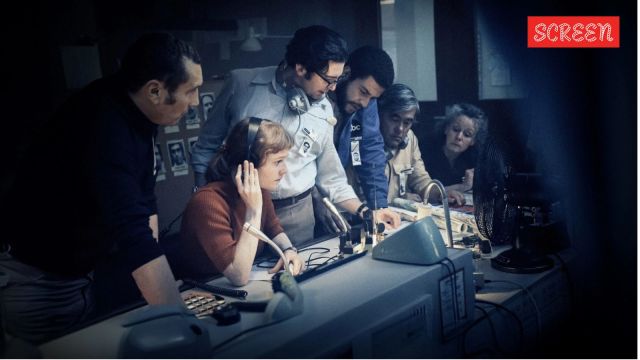Click here to follow Screen Digital on YouTube and stay updated with the latest from the world of cinema.
September 5 movie review: John Magaro, Peter Sarsgaard star in a tense but thematically shallow retelling of the Munich massacre
September 5 movie review: The infamous 1972 Summer Olympics held in Munich told through the perspective of ABC Sports journalists. This Tim Fehlbaum directorial is less of a traditional historical drama and more of a psychological chamber piece wrapped in the aesthetics of a newsroom under siege.
 September 5 movie review: Tim Fehlbaum's directorial captures the relentless pressure of live reporting
September 5 movie review: Tim Fehlbaum's directorial captures the relentless pressure of live reportingSome moments in history redefine global consciousness, permanently altering our understanding of politics, media, and conflict. The 1972 Munich Olympics attack, in which members of the Palestinian terrorist group Black September took Israeli athletes hostage, is one such moment. Tim Fehlbaum’s September 5 is not a conventional retelling of the incident—it does not attempt to reconstruct every detail of the tragedy as seen in films like Munich (2005). Instead, it shifts the perspective, focusing on the ABC Sports broadcasting team, who found themselves unwilling witnesses to history, forced to reckon with their role as the first global mediators of terror. The result is a film that grips you from the first frame and refuses to let go—a bottle-movie thriller that tries to stay apolitical, and that, ultimately, is its biggest flaw.
Told through the perspective of ABC Sports journalists, September 5 is less of a traditional historical drama and more of a psychological chamber piece wrapped in the aesthetics of a newsroom under siege. The film opens amid Olympic excitement, as ABC Sports covers American swimmer Mark Spitz’s victory over a West German competitor. As the network’s president, Roone Arledge (Peter Sarsgaard), makes the editorial choice to cut to the defeated athlete’s reaction, his colleague Marvin Bader (Ben Chaplin) questions the decision. Arledge defends it, insisting, “It’s not political, it’s about the emotions.” And that’s where the movie starts biting its own arm—but more on that later.
That illusion of sporting unity shatters overnight. Distant gunshots echo, and reports trickle in: a terrorist group has stormed the Israeli team’s quarters, taking hostages and demanding the release of Palestinian prisoners. The film takes place almost entirely within the ABC Sports control room, where producer Geoffrey Mason (John Magaro) is leading the broadcast team on his first day in charge when the hostage crisis begins. Alongside him is Arledge, who must decide how much of this unfolding horror should be aired live. There’s no backstory, no personal stakes beyond the job at hand—just the immediacy of the moment. And in that sense, September 5 is an exercise in restraint, one that captures the relentless pressure of live reporting but, at times, feels oddly detached from its own subject matter.
 A shot inside the ABC broadcasting studio in September 5
A shot inside the ABC broadcasting studio in September 5
Unlike Steven Spielberg’s Munich, which focused on the Israeli response to the attack, September 5 doesn’t engage with the larger geopolitical implications of the event. It’s not about what led to this moment or what came after—it’s about the mechanics of broadcasting history as it happens. The film thrives in its attention to journalistic process, showing how information is gathered, verified, and delivered under immense pressure.
The control room scenes are where the film is most alive. Fehlbaum captures the frantic energy of people trying to piece together a story with only fragments of truth. Information trickles in, contradictory reports flood the airwaves, and decisions must be made on the fly. The tension is real, and Magaro’s performance sells the mounting anxiety of a man who suddenly finds himself responsible for how the world perceives an ongoing tragedy.
Yet, despite its precision in depicting the chaos of live news coverage, the film sometimes feels oddly shallow. It doesn’t offer much beyond the immediate moment. The characters remain largely undeveloped—there’s no sense of what they stand to lose if they make the wrong call, no personal stakes beyond the professional. We know it’s Mason’s first day leading the broadcast, and that’s enough to make us root for him. But for everyone else, the film doesn’t give us much to hold onto.
One of the most interesting contradictions in September 5 comes early on when Bader questions Arledge about his editorial choices, prompting Arledge’s response: “It’s not political, it’s about the emotions.” The film itself seems to take a similar stance—keeping its focus on the emotional and professional weight of the journalists rather than the politics of the attack. But in doing so, it inadvertently becomes deeply political. By not engaging with the larger conflict at play, the film leaves out the essential context that makes Munich one of the most significant acts of terror in modern history.
September 5 trailer:
This omission feels particularly glaring in today’s climate, where the Israel-Palestine conflict remains as fraught as ever. Watching a film about the 1972 attack in 2025, when headlines about Gaza dominate the news, it’s impossible to separate the past from the present. The movie doesn’t address this—nor does it have to—but the lack of a broader perspective makes it feel incomplete. It’s a film that asks you to focus on the trees while ignoring the forest.
Fehlbaum directs with a steady hand, keeping the camera mostly confined to the control room, emphasising the claustrophobia of the situation. The cinematography by Markus Förderer is effective, using dim lighting and close-ups to heighten the sense of urgency. The score by Lorenz Dangel is minimal, relying on the tension of silence rather than dramatic orchestration.
Yet, despite these strong technical choices, the film maintains a strange emotional distance. There’s a coldness to its approach—perhaps intentional, given the journalistic perspective—that makes it feel more like an intellectual exercise than a gripping drama. Its 94-minute runtime helps prevent it from becoming tedious, though.
One of the other pros is the performance of Leonie Benesch as Marianne Gebhardt, the team’s German translator. Her presence in the newsroom carries an unexpected weight. She wasn’t there to witness the Holocaust, but she has lived through its echoes—through the voices of those who hold her generation accountable. When the Munich massacre unfolds, it’s she who seems to feel it most personally. Benesch delivers another strong performance, following her riveting turn in The Teacher’s Lounge (2023). Her moments in the film resonate more deeply than expected, adding a much-needed layer of human emotion.
 Leonie Benesch as Marianne Gebhardt in September 5
Leonie Benesch as Marianne Gebhardt in September 5
Yet these moments remain fleeting, and the film never quite finds the emotional core that would elevate it beyond being just a well-made thriller.
September 5 is a solid film—well-crafted, well-acted, and effective in capturing the chaos of live journalism. But it never quite reaches greatness. It feels restrained to a fault, too hesitant to engage with the bigger picture, and too emotionally distant to fully immerse the viewer.
For those who love process-driven journalism films like Spotlight (2015) or The Post (2017), there’s plenty to admire here. But for a story as monumental as Munich, this approach feels limiting. The film ultimately works as a tense procedural, but it stops short of saying anything profound about the event it portrays.
September 5
September 5 Director – Tim Fehlbaum
September 5 Cast – John Magaro, Leonie Benesch, Peter Sarsgaard, Ben Chaplin, Zinedine Soualem
September 5 Rating – 2.5/5


- 01
- 02
- 03
- 04
- 05
































